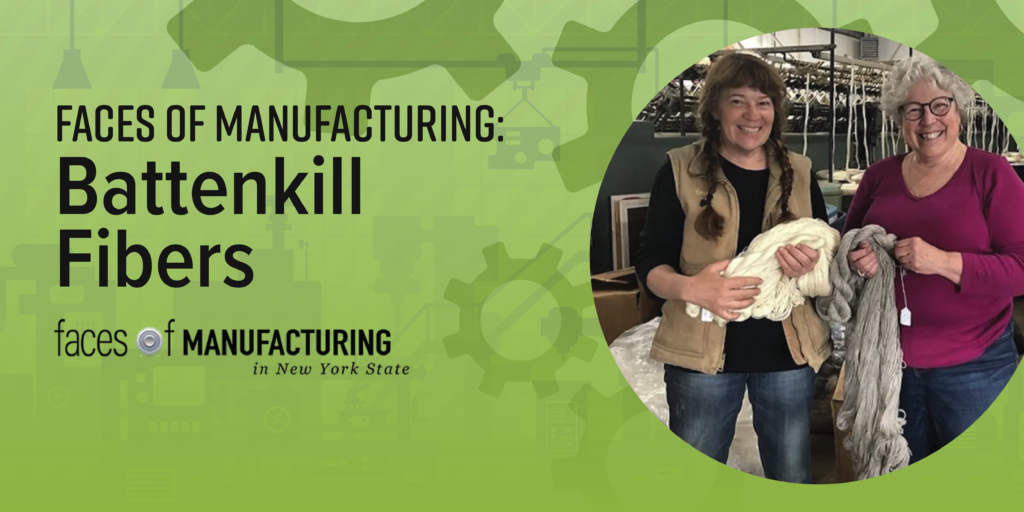Battenkill Fibers Carding and Spinning Mill, in Greenwich, Washington County, manufactures premium knitting yarn for hand knitters, yarn companies, and brands. Founded in 2009 by owner Mary Jeanne Packer, the company is meeting the growing demand for sustainability and traceability represented by the “Who Made My Clothes?” movement with locally sourced materials, fair pay practices, and environmentally responsible choices at every step in the process. It uses refurbished traditional milling machinery to produce 100-150 pounds a day of artisan-quality yarn, which then finds its way all over the world.
“Our business has grown in ways no business planner could have ever estimated,” Packer said.
“A place I can combine all my skills”
Battenkill Fibers is actually Packer’s fourth career. She attended MIT, graduating with a degree in Engineering. Her work-study job in the main dining hall had her overseeing other student workers and learning valuable management skills.
After graduation, she was recruited to join New England Telephone Co. to work on a microwave antenna program. This took her to rural Vermont, where she switched jobs to work for the U.S. Forest Service for the next 16 years. She then formed a consulting firm, working with clients in the forestry and woodworking industries. Through her clients she learned about setting up a manufacturing facility, scheduling jobs and machines, finding employees, maintaining workplace safety and embracing the concept of value-added agriculture.
“I coupled that awareness with my love of knitting and thought ‘here is a place I can combine all my skills,’” she said. “That is what brought me to this.”
She opened the mill in 2009 in a 5,000 square foot Washington County facility, which a year later burnt to the ground, “taking everything with it including my life savings.”
Packer was not ready to give up, and thanks to three angel investors, Battenkill Fibers was able to resume business in its current location in Greenwich within months of the fire. In 2015, the business turned its first profit. It was only $50, but it was a sign of things to come. By this time, the company employed 10 people and was named Washington County’s Small Business of the Year. Since then, it has continued to grow and add employees and customers.
“I credit a lot of that growth to the interest by the consumer in knowing ‘who made my clothes,’” Packer said. “For a while we’ve been riding the sustainability bandwagon. More recently it is traceability, where people want to know all the steps in the supply chain. And since the pandemic, people want to know you are being responsible. More and more consumers are showing an interest in supporting local farms and a concern about local jobs.”
This interest in the supply chain led to the founding, by Packer and others, of the Hudson Valley Textile Project, a community of farmers, dyers, millers, designers, makers, distributors, and retailers committed to supporting a sustainable model of regionally sourced, processed, and manufactured fiber products.
International Business
Packer also had a hand in the 2019 launch of Hudson + West, now one of the world’s largest locally sourced and minimally processed yarn companies.
“Because we spin for Hudson + West and other international brands, yarns that have been spun here end up going all over the world,” she said. “Hand knit designers are asking for it. They don’t know they are buying Battenkill Fibers because we don’t brand yarn. Our yarn goes wherever our customers go.”
Then came the pandemic and the supply chain disruptions that accompanied it, bringing Battenkill Fibers a rush of new business.
“They came to us because they had to, even though our yarns are considerably more expensive because we pay a living wage and a fair price for wool,” Parker said.
The surge in demand caused some bottlenecks, including in the scouring of large batches of wool. Battenkill currently sends large lots to South Carolina for cleansing, which can mean high freight charges and sometimes delays.
Therefore, earlier this year Hudson Valley Textile Project and Battenkill Fibers jointly applied for a FuzeHub Manufacturing Grant and received $50,000 to purchase a scouring line which is being installed at a mill in Newburgh.
Packer’s most recent move was to acquire Oysters and Purls—a line of botanically dyed yarns for hand knitters—from one of her customers.
“That is what we will be working on this fall with some designer partnerships and trade shows to promote that new brand,” she said.
Moving On
Packer, who is 65, foresees additional growth for Battenkill Fibers, but she will not necessarily be in charge when it happens. Her plan is to find the right buyer who will keep the mill in Greenwich and expand it in some way.
“That could be adding a line for processing bast fibers, which is hemp, or maybe adding some machine knitting,” she said. “There are no sock knitting mills anywhere in the state. Or possibly automated weaving of blankets or woven fabric. I would like to put that into place in the next few years to help a new buyer not only run the place but bring in some of these value-added items as we move to the end of the decade.”

